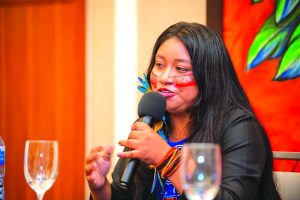This article was added by the user . TheWorldNews is not responsible for the content of the platform.
A 21-year-old Wapichan youth has shared some of the challenges faced by Indigenous students in accessing a better level of education, as she called on authorities to continue doing more to bridge the gap between the coast and the hinterland.
Judy Winter from Aishalton Village, Region Nine (Upper Takutu-Upper Essequibo) is currently pursuing her tertiary education at the University of Guyana (UG), and noted concerns in the hinterland surrounding housing, digital access and scholarship opportunities.
 Judy Winter
Judy Winter “Imagine a young 14-year-old girl in a small Indigenous community in the hinterland who has dreams of attending a university to become a medical doctor, for example. That girl wouldn’t know that right now, those are just dreams because life in the hinterland is hard especially when it comes to education,” Winter during an Amerindian Peoples Association (APA) forum on Tuesday.
Dormitory living, while she has not experienced it firsthand, is particularly difficult, according to Winter, as hundreds of children in far-flung hinterland villages have often had to move far away from their homes to attend school.
Winter’s colleague, whom she spoke to prior to Tuesday’s forum, described her four-year dorm experience as difficult and one lacking freedom and privacy.
“Instead, you are confined to your room with three other girls or share an entire flat with over 40 girls who come from various villages in the Upper Mazaruni. My day usually starts at 04:00h every morning. There is no running water so we have to either wait for our turn to get rain water from the tanks or walk down to the river which is very cold at that time of the morning,” Winter said of her colleague’s experience.
The situation is similar for Indigenous youths who would have to move to cities like Georgetown to pursue even higher education, as she is doing through UG, Winter noted.
She further lamented on the rarity of scholarship opportunities.
“Those that are available are limited to some courses and would mostly just cover tuition and the student would have to find rent, food, electricity and so on,” Winter said.
The Wapichan youth also called for affordable, reliable and efficient internet access in the hinterland, as it would, among other things, greatly assist in online learning.
Developments
Recent developments, however, are in the works to build an annex of UG at Aishalton Village and the community’s Toshaos have already begun conversations with UG Vice Chancellor Paloma Mohamed Martin on the matter.
Winter also commended the Quality Bilingual Education Programme (QBEP), a collaborative effort between the local communities of the South Rupununi, the Intercultural Bilingual Education Organisation and the Education Ministry.
The programme aims to provide an inclusive, equitable and quality education which affirms and respects the culture and identity of Indigenous children in Guyana’s hinterland.
“That programme has produced great results and this year, it has expanded to all the schools in the South Rupununi and into other grades in the primary schools,” Winter said.
Winter stressed that education delivery should be better suited towards persons in the hinterland and their needs and wants, and not merely what can be afforded or what is available.
“We dream that our people would be well educated and serve as great leaders and the younger generation will be familiar with and employ our traditional knowledge and use that to better develop our communities,” Winter said. (G13)




